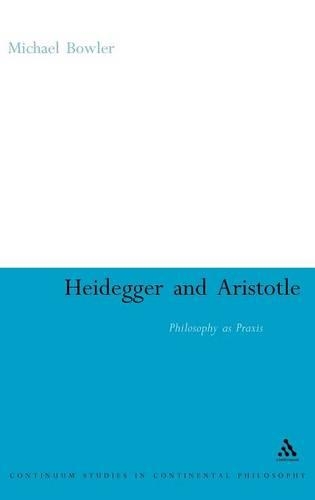
Heidegger and Aristotle: Philosophy as Praxis
(Hardback)
Publishing Details
Heidegger and Aristotle: Philosophy as Praxis
By (Author) Dr Michael Bowler
Bloomsbury Publishing PLC
Continuum International Publishing Group Ltd.
15th April 2008
United Kingdom
Classifications
Tertiary Education
Non Fiction
Ancient Greek and Roman philosophy
193
Physical Properties
Hardback
180
Width 156mm, Height 234mm
418g
Description
Much has been written about Heidegger's reappropriation of Aristotle, but little has been said about the philosophical import and theoretical context of this element of Heidegger's work. In this important new book, Michael Bowler sheds new light on the philosophical context of Heidegger's return to Aristotle in his early works and thereby advances a reinterpretation of the background to Heidegger's forceful critique of the primacy of theoretical reason and his radical reconception of the very nature of philosophical thinking. This book offers a detailed analysis of the development of Heidegger's thought from his early enagagement withneo-KantianismandHusserlian phenomenology.Through this reading, a criticism of the theoretical conception of philosophy as primordial science, especially in relation to life and lived-experience (Erlebnis), emerges. It is in this context that Bowler examines Heidegger's reappropriation of key aspects of Aristotle's thought. In Aristotle's notions of movement, life and activity proper (praxis), Heidegger perceives a new approach to the dilemma presently facing philosophy, namely how philosophy is situated within life and human existence.
Reviews
"Rather than directly presenting an interpretation of the relationship between Aristotle and Heidegger, Bowler's book examines the relationship indirectly through a discussion of Heidegger's confrontation with the work of his contemporaries, with representatives of German neo-Kantianism, Lebensphilosophie, and phenomenology figuring most prominently in Bowler's account. These chapters present clear readings of figures such as Ricker, Husserl, Natorp, and Delthey... This book provides insights into the figures that influenced Heidegger's early thought in a thoroughly lucid and engaging manner. Summing Up: Recommended.Graduate students and faculty/researchers." -C.R. McCall, CHOICE, January 2009
Mention -Chronicle of Higher Education, August 15, 2008
"... the book is definitely worth reading for the Heidegger scholar because of the breadth of ground covered and the freshness of some of the interpretation. Bowler also attempts to go beyond simply interpreting Heidegger's works to essay a reformulation of Heidegger's understanding of philosophy, something worthy of respect both for the difficulty of the undertaking and the (relatively) jargon-free expression he brings to the topic." - The Review of Metaphysics
'Bowler does a splendid job of bringing to light the philosophical landscape of Heidegger's early years, and he does this in a way that is both plausible and illuminating ...Bowler's book challenges us to re-think Heidegger's project, as well as how it relates to the context thatproduces and sustains it. It is a fine work of philosophy in its own right, and a welcome contribution to the praxis of philosophy.' - Philosophy in Review
Author Bio
Michael Bowler is Assistant Professor of Philosophy at Michigan Technological University. He holds a PhD in Philosophy from the University of Notre Dame, USA.
